高考英语一轮复习Module3TheViolenceofNature教学案外研版必修
- 格式:doc
- 大小:296.50 KB
- 文档页数:12
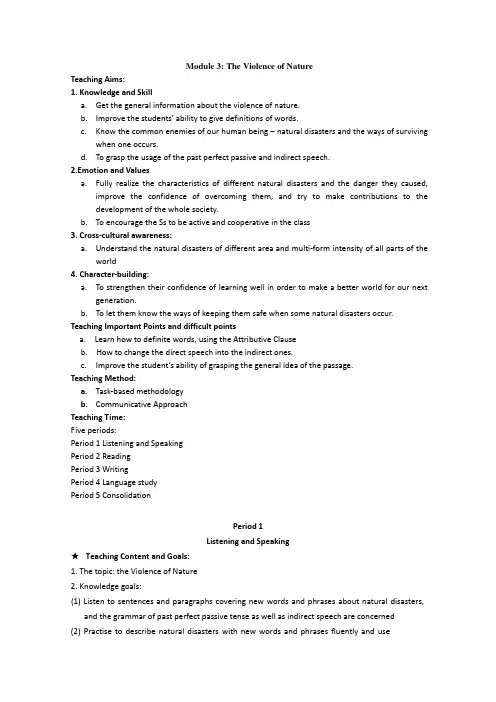
Module 3: The Violence of NatureTeaching Aims:1. Knowledge and Skilla.Get the general information about the violence of nature.b.Improve the students’ ability to give definitions of words.c.Know the common enemies of our human being – natural disasters and the ways of survivingwhen one occurs.d.To grasp the usage of the past perfect passive and indirect speech.2.Emotion and Valuesa.Fully realize the characteristics of different natural disasters and the danger they caused,improve the confidence of overcoming them, and try to make contributions to the development of the whole society.b.To encourage the Ss to be active and cooperative in the class3. Cross-cultural awareness:a.Understand the natural disasters of different area and multi-form intensity of all parts of theworld4. Character-building:a.To strengthen their confidence of learning well in order to make a better world for our nextgeneration.b.To let them know the ways of keeping them safe when some natural disasters occur. Teaching Important Points and difficult pointsa. Learn how to definite words, using the Attributive Clauseb. How to change the direct speech into the indirect ones.c.Improve the student’s ability of grasping the general idea of the passage.Teaching Method:a.Task-based methodologymunicative ApproachTeaching Time:Five periods:Period 1 Listening and SpeakingPeriod 2 ReadingPeriod 3 WritingPeriod 4 Language studyPeriod 5 ConsolidationPeriod 1Listening and Speaking★Teaching Content and Goals:1. The topic: the Violence of Nature2. Knowledge goals:(1) Listen to sentences and paragraphs covering new words and phrases about natural disasters,and the grammar of past perfect passive tense as well as indirect speech are concerned(2) Practise to describe natural disasters with new words and phrases fluently and usepast perfect passive tense and indirect speech if it is necessary3. Teaching goals:Students are able to write and talk about a natural disaster★Teaching Important Points and Teaching Difficult Points:1. Teaching important points:Pronunciation of new words; Talk about the natural disasters in theworld.2. Teaching difficult points:To describe a natural disaster you have experienced.★Teaching Methods and Approach:1. Teaching methods:Student-centered interactive classroom; communicative and heuristicteaching method2. Teaching approach: the use of multimedia teaching approach★Teaching procedures:Step 1: Warming up (5 minutes)1 Remind the students of the tsunami in 2004 with a picture and talk about it.2 Ask the students to talk about it, such as Sri Lanka , Indonesia , Thailand , India, Malaysia and East Africa destroyed by the monster waves, causing millions of deaths.3 Ask the students to talk about the pictures in the Introduction, page 21.Step 2: Lead-in (part 1, page 21) (5 minutes)Get students to match the words in the box with the definitions below. Then ask individuals to show their answers.Step 3: Discussion (5 minutes)1. Put the students into groups of four to discuss the questions.2. Then open up the discussion to the whole class. Make notes on the board, especially of relevantvocabulary which may be new.Step 4: Words study (Workbook Page 80) (5 minutes)Ask the students to turn to Page 80 and begin the task in vocabulary. (Exercise 5)Choose one student to read out the answers and check them with the whole class. Then the students read the sentences together.Answers: volcano, eruption, ash, lava, tidal wave, flood.Step 5: Practice of speaking (10 minutes)1. Personal Experience: Ask the students to talk about their personal experience onnatural disasters and share the experience with each other.2. Role-Play: Ask the students to work in pairs and make a dialogue as a reporter and asurvivor; the content of the dialogue should cover the questions as “What hashappened? When did it happen and how long did it last? How did you survive it? etc.”Step 6: Listening and Vocabulary(10 minutes)1. Ask the students to turn to Page 25 and complete the first part.2. Try to finish the Part Three.3. Listen to a paragraph and underline the words which the speaker stresses.Step7: Summary (4 minutes)Every student is asked to think about what he learns in the period and tell what he learnsto his partner.Step8: Homework(1 minute)1. Read the “Everyday English ” part in the Power Point and get familiar with the adverbs.2. Surf the Internet for ways to avoid much damage from disasters.3. Make three sentences to define the words earthquake, volcanic eruption,and plane crash,using the Attributive Clause.Period 2Reading★Teaching Content and Goals:1. The topic: the Violence of Nature2. Knowledge goals: Read the text with new words and phrases, as well as sentences with past perfect passive tense and indirect speech; get the information about different kinds of disasters and have a good understanding about them.3. Teaching goals:Students are able to●read about the Gulf Stream and check the meaning of the words.●know what a Tornado is without looking at their books.●talk about something about a Hurricane.●learn some words like tropical, occur, disaster and so on by heart by finding them and matchthem with the definitions.★Teaching Important Points and Teaching Difficult Points:1. Teaching important points: Read and get certain information about what a tornado is; what ahurricane is, and an extraordinary event2. Teaching difficult points: How to help students improve their reading ability?★Teaching Methods and Approach:1. Teaching methods:Student-centered interactive classroom; communicative and heuristicteaching method2. Teaching approach: the use of multimedia teaching approach★Teaching procedures:Step 1: Revision (4 minutes)Ask three or four students to read the word list and ask other students to correct their wrong pronunciations.Step 2:Work in pairs on a special report about disasters and interview some students. (5 minutes)Questions may like these:1 Have you ever experienced (a flood, a tornado a thunderstorm, a hurricane)?2 Do you know anyone who has experienced one of the events?3 Have you ever read a news story about one of the events? Can you describe it?4 Do you know anything about the events? For example, what causes them?Step 3: Read about the Gulf Stream and check the meaning of the words on Page 22. (5 minutes) Step 4: Skimming (3 minutes)Skim the three articles on Page 23 and match the article with its main idea.Step 5: Scanning (7 minutes)Scan the three articles and then answer the questions on the Power Point.Step 6: reading(10 minutes)Step7:Find the words and expressions in the passages and match them with the definitions. (6 minutes)Step8: Summary (4 minutes)Summarize the information what we have learned about the natural disasters in the articles together.Step 9: Homework (1 minute)1.Collect more information on Internet about one of the disasters (for examples: hurricane;tornado; thunderstorm; volcanic; eruption; earthquake tsunami flood).2.Read it and have a good understanding about it.Period 3Writing★Teaching Content and Goals:1. The topic: the Violence of Nature2. Knowledge goals:write essays with the words and grammar points we have learned; complete the requested practices in the book and be able to compare the differences between different natural disasters in different areas.3. Teaching goals:Students are able to write essays proficiently with what we have learned in the class.★Teaching Important Points and Teaching Difficult Points:1. Teaching important points:Language Points2. Teaching difficult points:How to make an essay coherent?★Teaching Methods and Approach:1.Teaching methods:Student-centered interactive classroom; communicative and heuristicteaching method2. Teaching approach: the use of multimedia teaching approach★Teaching procedures:Step 1: Brainstorming (5 minutes)Step 2: Read the passage aloud. (2 minutes)Step 3: Complete the exercise on Power Point by yourselves (3 minutes)Step 4: Topical Writing (34 minutes)1. Volcano (17 minutes)(1) Language points about volcano(2) Exercises on writing an essay about volcano2. Earthquake (17 minutes)(1) Language points about earthquake(2) Exercises on writing an essay about earthquakeStep 5: Homework (1 minute)●Please surf the Internet or read some related news to collect the information aboutWenchuan Earthquake first.●Then read and organize the information.●And you need to write a report about the earthquake with 150 words.Period 4Language Study★Teaching Content and Goals:1. The topic: the Violence of Nature2. Knowledge goals:Learn the grammar of past perfect passive tense and indirect speech; learn about new words and their usage.3. Teaching goals:Students are able to use new words and the grammar of past perfect passive tense as well as indirect speech proficiently.★Teaching Important Points and Teaching Difficult Points:1. Teaching important points:Language Points2. Teaching difficult points: the grammar of past perfect passive tense★Teaching Methods and Approach:1.Teaching methods:Student-centered interactive classroom; communicative and heuristic teaching method2. Teaching approach: the use of multimedia teaching approach★Teaching procedures:Step 1: the grammar of the past perfect passive (17minutes)(1)Introduction of the past perfect passive(2)Related exercises on Page 24Step 2: the grammar of indirect speech (17minutes)(1) Introduction of the indirect speech(2) Related exercises on Page 26Step 3: Words (10 minutes)(1) Introduction of the new words (e.g. rotate ;violent; occur; pick up; take off; on average)(2) Instruction of the usageStep 4: Homework (1 minute)1. Be familiar with the grammar☆ the past perfect passive☆ the indirect speech2. Be familiar with the wordsPeriod 5Consolidation★Teaching Content and Goals:1. The topic: the Violence of Nature2. Knowledge goals: Review the language points we have learned3. Teaching goals:Students are able to describe natural disasters proficiently, and master the grammar of past perfect passive and indirect speech.★Teaching Important Points and Teaching Difficult Points:1. Teaching important points:Language Points2. Teaching difficult points:the communicative ability and the grammar points★Teaching Methods and Approach:1.Teaching methods:Student-centered interactive classroom; communicative and heuristic teaching method2. Teaching approach: the use of multimedia teaching approach★Teaching procedures:Step 1:Guessing the meaning of “take off” (5 minutes)Step 2: Translating the sentences (5 minutes)Step 3: Multiple choice (8 minutes)Step 4: Fill in the blanks with proper phrases (6 minutes)Step 5: Word spelling (5 minutes)Step 6: Fill in the blanks with proper words (5 minutes)Step 7: Grammar exercises (10 minutes)Step 8: Homework (1 minute)●Make a list of what we have learned in this unit including the new words and the grammarpoints.●Write an essay about a natural disaster in 150 words.。
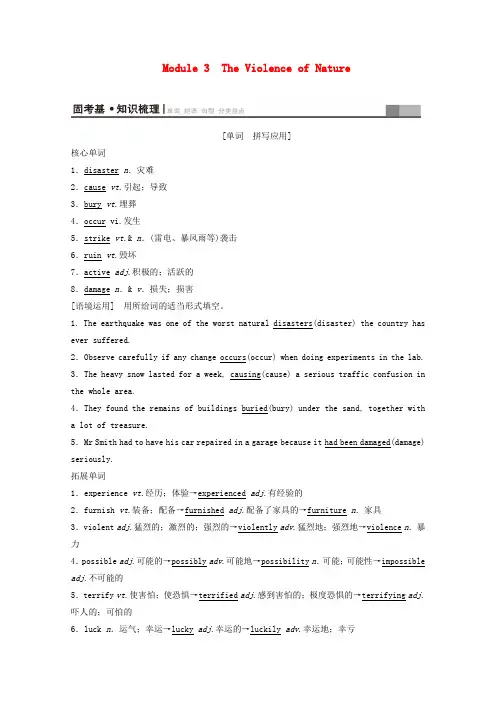
Module 3 The Violence of Nature[单词拼写应用]核心单词1.disaster n.灾难2.cause vt.引起;导致3.bury vt.埋葬4.occur vi.发生5.strike vt.& n.(雷电、暴风雨等)袭击6.ruin vt.毁坏7.active adj.积极的;活跃的8.damage n.& v.损失;损害[语境运用] 用所给词的适当形式填空。
1. The earthquake was one of the worst natural disasters(disaster) the country has ever suffered.2.Observe carefully if any change occurs(occur) when doing experiments in the lab. 3.The heavy snow lasted for a week, causing(cause) a serious traffic confusion in the whole area.4.They found the remains of buildings buried(bury) under the sand, together with a lot of treasure.5.Mr Smith had to have his car repaired in a garage because it had been damaged(damage) seriously.拓展单词1.experience vt.经历;体验→experienced adj.有经验的2.furnish vt.装备;配备→furnished adj.配备了家具的→furniture n.家具3.violent adj.猛烈的;激烈的;强烈的→violently adv.猛烈地;强烈地→violence n.暴力4.possible adj.可能的→possibly adv.可能地→possibility n.可能;可能性→impossible adj.不可能的5.terrify vt.使害怕;使恐惧→terrified adj.感到害怕的;极度恐惧的→terrifying adj.吓人的;可怕的6.luck n.运气;幸运→lucky adj.幸运的→luckily adv.幸运地;幸亏7.hope v.& n.希望;期望→hopeful adj.有希望的→hopefully adv.满怀希望地;有希望地8.sad adj.伤心的→sadly adv.伤心地;不幸地→sadness n.悲伤9.fortune n.运气;财富→fortunate adj.幸运的→fortunately adv.幸运地;幸亏10.warn v.警告→warning n.警告[语境运用] 用所给词的适当形式填空。
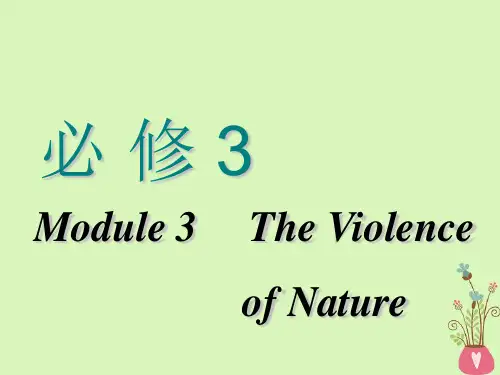
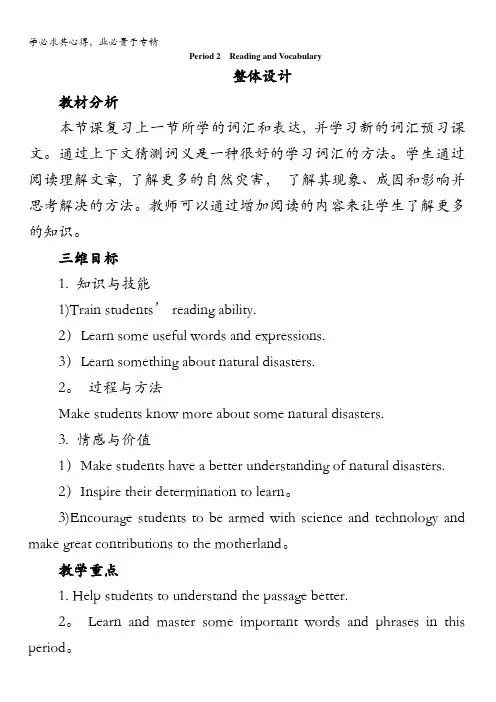
Period 2Reading and Vocabulary整体设计教材分析本节课复习上一节所学的词汇和表达, 并学习新的词汇预习课文。
通过上下文猜测词义是一种很好的学习词汇的方法。
学生通过阅读理解文章, 了解更多的自然灾害,了解其现象、成因和影响并思考解决的方法。
教师可以通过增加阅读的内容来让学生了解更多的知识。
三维目标1. 知识与技能1)Train students’ reading ability.2)Learn some useful words and expressions.3)Learn something about natural disasters.2。
过程与方法Make students know more about some natural disasters.3. 情感与价值1)Make students have a better understanding of natural disasters.2)Inspire their determination to learn。
3)Encourage students to be armed with science and technology and make great contributions to the motherland。
教学重点1. Help students to understand the passage better.2。
Learn and master some important words and phrases in this period。
教学难点1. How to help students improve their reading ability and understand the passage better.2。
How to master the important language points in this passage.教学方法1。
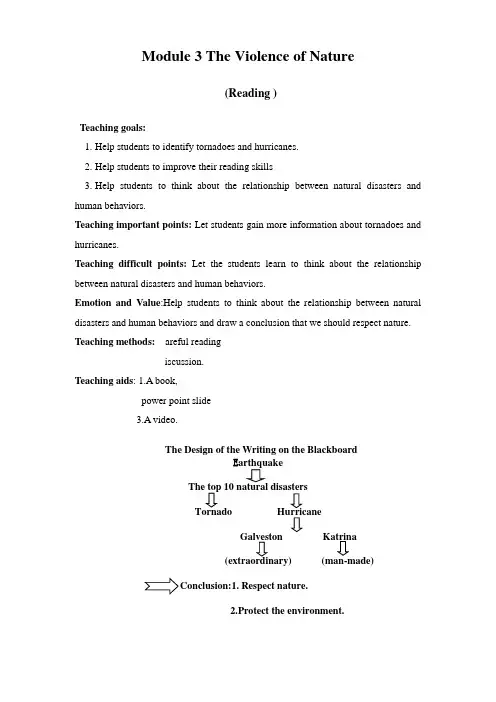
Module 3 The Violence of Nature(Reading )Teaching goals:1.Help students to identify tornadoes and hurricanes.2.Help students to improve their reading skills3.Help students to think about the relationship between natural disasters and human behaviors.Teaching important points: Let students gain more information about tornadoes and hurricanes.Teaching difficult points: Let the students learn to think about the relationship between natural disasters and human behaviors.Emotion and Value:Help students to think about the relationship between natural disasters and human behaviors and draw a conclusion that we should respect nature. Teaching methods: areful readingiscussion.Teaching aids: 1.A book,power point slide3.A video.The Design of the Writing on the BlackboardE arthquakeConclusion:1. Respect nature.2.Protect the environment.Teaching proceduresStep I Lead-in1.Show two pictures about the earthquakes happened in Luzhou City.2.Show the pictures of the top 10 natural disasters.Step II ReadingTask 1. Read the passage (part 1 and part 2) carefully and fill in the blanks.Task 2. Ask students to read an extraordinary event carefully an judge whether the following statements are true or false.1)Charles Coghlan didn't become famous until he moved to New York.2)Coghlan’s coffin was destroyed by the 1900 Galveston hurricane.3)It was only because of the hurricane that Coghlan’s body could travel back to Canada.Task 3 Let students retell the extraordinary story and guess what “extraordinary〞means.Step III Thinking1.Watch a video about the Hurricane Katrina.2.Let the students say what information can they get from the video.3.Help the students to realize that some human behaviors may increase the damages of a natural disaster.Step IV DiscussingLet the students list some other behaviors may have a bad effect on nature and even cause a natural disasters.Step Ⅴ SummaryHelp the students to draw a conclusion that we should respect the nature and avoid doing anything that may have a bad effect on nature.Step VI HomeworkWrite a short passage to introduce a kind of natural disaster, and tell the public what we should do to protect the nature and environment.。
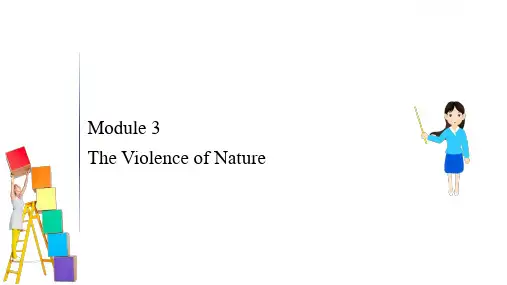
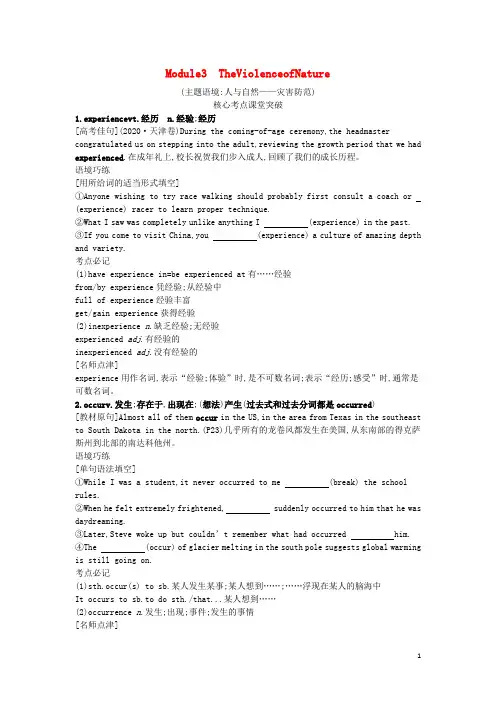
Module3 TheViolenceofNature(主题语境:人与自然——灾害防范)核心考点课堂突破1.experiencevt.经历n.经验;经历[高考佳句](2020·天津卷)During the coming-of-age ceremony,the headmaster congratulated us on stepping into the adult,reviewing the growth period that we had experienced.在成年礼上,校长祝贺我们步入成人,回顾了我们的成长历程。
语境巧练[用所给词的适当形式填空]①Anyone wishing to try race walking should probably first consult a coach or (experience) racer to learn proper technique.②What I saw was completely unlike anything I (experience) in the past.③If you come to visit China,you (experience) a culture of amazing depth and variety.考点必记(1)have experience in=be experienced at有……经验from/by experience凭经验;从经验中full of experience经验丰富get/gain experience获得经验(2)inexperience n.缺乏经验;无经验experienced adj.有经验的inexperienced adj.没有经验的[名师点津]experience用作名词,表示“经验;体验”时,是不可数名词;表示“经历;感受”时,通常是可数名词。
2.occurv.发生;存在于,出现在;(想法)产生(过去式和过去分词都是occurred)[教材原句]Almost all of them occur in the US,in the area from Texas in the southeast to South Dakota in the north.(P23)几乎所有的龙卷风都发生在美国,从东南部的得克萨斯州到北部的南达科他州。
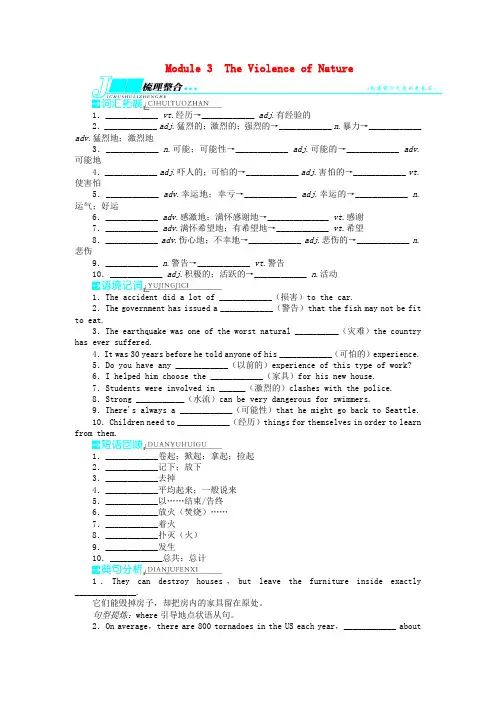
Module 3 The Violence of Nature1.____________ vt.经历→____________ adj.有经验的2.____________ adj.猛烈的;激烈的;强烈的→____________ n.暴力→____________ adv.猛烈地;激烈地3.____________ n.可能;可能性→____________ adj.可能的→____________ adv.可能地4.____________ adj.吓人的;可怕的→____________ adj.害怕的→____________ vt.使害怕5.____________ adv.幸运地;幸亏→____________ adj.幸运的→____________ n.运气;好运6.____________ adv.感激地;满怀感谢地→______________ vt.感谢7.____________ adv.满怀希望地;有希望地→____________ vt.希望8.____________ adv.伤心地;不幸地→____________ adj.悲伤的→____________ n.悲伤9.____________ n.警告→____________ vt.警告10.____________ adj.积极的;活跃的→____________ n.活动1.The accident did a lot of ____________(损害)to the car.2.The government has issued a ____________(警告)that the fish may not be fit to eat.3.The earthquake was one of the worst natural __________(灾难)the country has ever suffered.4.It was 30 years before he told anyone of his ____________(可怕的)experience.5.Do you have any ____________(以前的)experience of this type of work?6.I helped him choose the ____________(家具)for his new house.7.Students were involved in ______(激烈的)clashes with the police.8.Strong ___________(水流)can be very dangerous for swimmers.9.There's always a ____________(可能性)that he might go back to Seattle.10.Children need to ____________(经历)things for themselves in order to learn from them.1.____________卷起;掀起;拿起;捡起2.____________记下;放下3.____________去掉4.____________平均起来;一般说来5.____________以……结束/告终6.____________放火(焚烧)……7.____________着火8.____________扑灭(火)9.____________发生10.____________总共;总计1.They can destroy houses,but leave the furniture inside exactly ______________.它们能毁掉房子,却把房内的家具留在原处。
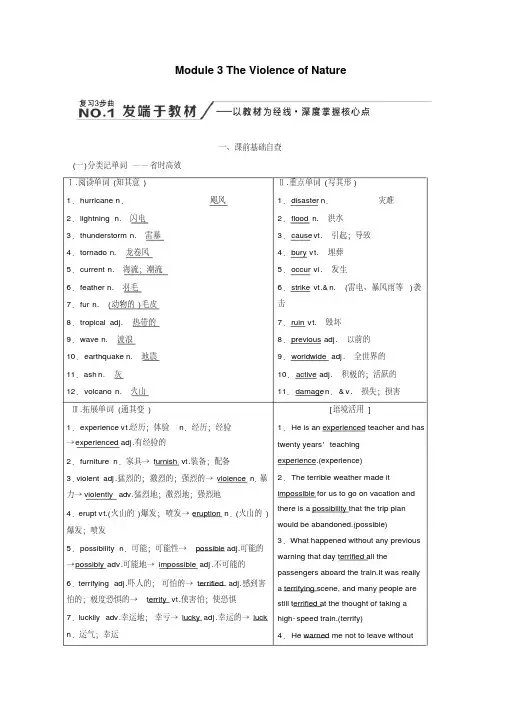
Module 3 The Violence of Nature一、课前基础自查(一)分类记单词——省时高效Ⅰ.阅读单词(知其意)1.hurricane n.飓风2.lightning n. 闪电3.thunderstorm n. 雷暴4.tornado n. 龙卷风5.current n. 海流;潮流6.feather n. 羽毛7.fur n. (动物的)毛皮8.tropical adj. 热带的9.wave n. 波浪10.earthquake n. 地震11.ash n. 灰12.volcano n. 火山Ⅱ.重点单词(写其形)1.disaster n.灾难2.flood n. 洪水3.cause vt. 引起;导致4.bury vt. 埋葬5.occur vi. 发生6.strike vt.&n. (雷电、暴风雨等)袭击7.ruin vt. 毁坏8.previous adj. 以前的9.worldwide adj. 全世界的10.active adj. 积极的;活跃的11.damage n.&v. 损失;损害Ⅲ.拓展单词(通其变)1.experience vt.经历;体验n.经历;经验→experienced adj.有经验的2.furniture n.家具→furnish vt.装备;配备3.violent adj.猛烈的;激烈的;强烈的→violence n.暴力→violently adv.猛烈地;激烈地;强烈地4.erupt vt.(火山的)爆发;喷发→eruption n.(火山的)爆发;喷发5.possibility n.可能;可能性→possible adj.可能的→possibly adv.可能地→impossible adj.不可能的6.terrifying adj.吓人的;可怕的→terrified adj.感到害怕的;极度恐惧的→terrify vt.使害怕;使恐惧7.luckily adv.幸运地;幸亏→lucky adj.幸运的→luck n.运气;幸运[语境活用]1.He is an experienced teacher and has twenty years' teachingexperience.(experience)2.The terrible weather made it impossible for us to go on vacation and there is a possibility that the trip plan would be abandoned.(possible)3.What happened without any previous warning that day terrified all the passengers aboard the train.It was really a terrifying scene, and many people are still terrified at the thought of taking a high-speed train.(terrify)4.He warned me not to leave without8.thankfully adv.感激地;满怀感谢地→thankful adj.感激的;感谢的→thank vt.&n.感谢;谢谢9.hopefully adv.满怀希望地;有希望地→hopeful adj.有希望的→hope v.& n.希望;期望10.sadly adv.伤心地;不幸地→sad adj.伤心的→sadness n.悲伤11.fortunately adv.幸运地;幸亏→fortunate adj.幸运的→fortune n.运气;财富12.warning n.警告→warn v.警告permission, but I didn't accept his warning.(warn)5.Many bad men struck their neighborhoods violently. People were angry at their violent behavior and resisted their violence bravely. (violent)(二)练中记短语——记牢用活写准记牢语境活用(选用左栏短语填空)1.pick_up卷起;掀起;拾起;用车接;(偶然)学会;好转2.take_off 去掉;脱掉;起飞3.set_fire_to 放火(焚烧)……4.catch_fire 着火5.put_out 扑灭(火)6.on_average 平均起来7.end_up 结果为……,以……结束8.in_all 总共;总计9.refer_to 指的是;谈到;涉及;参考1.The store caught_fire. Fortunately, all the people there escaped from it.2.A fire broke out in the building last night. Luckily, the firefighters arrived in time and put_out the fire.3.On_average each report requires 10 hours to prepare. 4.The teacher said there were twelve in_all who had failed the exam.5.I believe the house was deliberately set_fire_to.6.It was not until she took_off her dark glasses that I realized she was a famous film star.7.Twenty men fell into the water and were picked_up by other boats. As a result, they missed the fighting on the beach.8.If you don't eat less, you'll end_up looking like a whale!(三)仿写明句式——以用为本教材原句句式解读句式仿写1.They can destroy houses, but leave thefurniture inside exactly where it was. 它们(龙卷风)能毁掉房子,却把房内的家具留在原处。
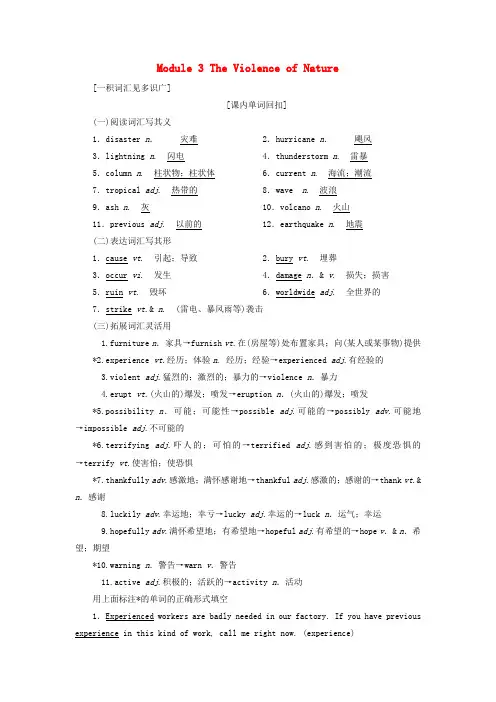
Module 3 The Violence of Nature[一积词汇见多识广][课内单词回扣](一)阅读词汇写其义1.disaster n.灾难 2.hurricane n.飓风3.lightning n. 闪电4.thunderstorm n. 雷暴5.column n. 柱状物;柱状体6.current n. 海流;潮流7.tropical adj. 热带的8.wave n. 波浪9.ash n. 灰10.volcano n. 火山11.previous adj. 以前的12.earthquake n. 地震(二)表达词汇写其形1.cause vt. 引起;导致2.bury vt. 埋葬3.occur vi. 发生4.damage n.& v. 损失;损害5.ruin vt. 毁坏6.worldwide adj. 全世界的7.strike vt.& n. (雷电、暴风雨等)袭击(三)拓展词汇灵活用1.furniture n.家具→furnish vt.在(房屋等)处布置家具;向(某人或某事物)提供*2.experience vt.经历;体验n. 经历;经验→experienced adj.有经验的3.violent adj.猛烈的;激烈的;暴力的→violence n.暴力4.erupt vt.(火山的)爆发;喷发→eruption n.(火山的)爆发;喷发*5.possibility n.可能;可能性→possible adj.可能的→possibly adv.可能地→impossible adj.不可能的*6.terrifying adj.吓人的;可怕的→terrified adj.感到害怕的;极度恐惧的→terrify vt.使害怕;使恐惧*7.thankfully adv.感激地;满怀感谢地→thankful adj.感激的;感谢的→thank vt.& n.感谢8.luckily adv.幸运地;幸亏→lucky adj.幸运的→luck n.运气;幸运9.hopefully adv.满怀希望地;有希望地→hopeful adj.有希望的→hope v.& n.希望;期望*10.warning n.警告→warn v.警告11.active adj.积极的;活跃的→activity n.活动用上面标注*的单词的正确形式填空1.Experienced workers are badly needed in our factory. If you have previous experience in this kind of work, call me right now. (experience)2.Thankfully,_I managed to pay off all my debts before we got married. We should be thankful that my boss had given me much help.(thank)3.What happened without any previous warning that day terrified all the passengers aboard the train. It was really a terrifying scene, and many people are still terrified at the tho ught of taking a highspeed train.(terrify) 4.The terrible weather made it impossible for us to go on vacation and there is a possibility that the trip plan would be abandoned.(possible) 5.He warned me not to leave without permission, but I didn't accept his warning.(warn)[话题单词积累]1.drought /draʊt/ n.干旱2.sandstorm /'sæn(d)stɔːm/ n. 沙尘暴3.typhoon /taI'fuːn/ n. 台风4.tsunami /tsuː'nɑːmI/ n. 海啸5.landslide /'læn(d)slaId/ n. 山体滑坡6.mudslide /'mʌdslaId/ n. 泥石流7.wildfire /'waIl(d)faIə/ n. 野火8.shortage /'ʃɔːtIdʒ/ n. 缺乏9.destroy /dI'strɒI/ vt. 摧毁,破坏10.disappear /dIsə'pIə/ vi. 消失11.threaten /'θret(ə)n/ v. 威胁12.predict /prI'dIkt/ vt. 预报,预言,预告13.frighten /'fraIt(ə)n/ vt. 使惊恐14.consequence /'kɒnsIkw(ə)ns/ n.结果,后果15.decline /dI'klaIn/ v. 减少,下降;衰退;谢绝16.decrease /dI'kriːs/ v. 减少,减小,降低17.harmony /'hɑːmənI/ n. 和谐18.uncertain /ʌn'sɜːt(ə)n/ adj. 不确定的19.natural /'nætʃ(ə)r(ə)l/ adj. 自然的20.nature/'neItʃə/ n. 自然;性质;种类21.punish/'pʌnIʃ/ vt. 惩罚,处罚22.punishment /'pʌnIʃm(ə)nt/ n.惩罚手段;处罚23.suffer /'sʌfə/ vi. 受苦;遭受24.proper /'prɒpə/ adj. 适当的,合适的25.surrounding /sə'raʊndIŋ/ adj. 周围的26.survival /sə'vaIv(ə)l/ n. 幸存;存活27.survive /sə'vaIv/ v. 幸存28.tolerate /'tɒləreIt/ vt. 容许,允许;忍受29.unbearable /ʌn'beərəb(ə)l/ adj.难耐的,无法接受的30.unbelievable /ʌnbI'liːvəb(ə)l/ adj. 难以置信的[二积短语顿挫抑扬][课内短语回扣](一)根据汉语写出下列短语*1.pick_up 卷起;拾起;搭载;(偶然)学会*2.take_off 去掉;脱掉;起飞;兴旺3.on_average 平均起来*4.end_up 结果为……;以……结束*5.in_all 总共;总计*6.set_fire_to 放火(焚烧)……7.catch_fire 着火*8.put_out 扑灭(火)9.take_place 发生10.do_damage_to 对……造成损害(二)用上面标注*的短语完成下列句子1.It's surprising that your brother picked_up Russian so quickly —he hasn't lived there very long.2.At first he refused to accept any responsibility but he ended_up apologizing.3.Only the shell of the factory is left after the fire has been put_out.4.The accident happened as the plane was about to take_off.5.How much do you have to pay in_all if the four of you go together?6.The gas main exploded suddenly and as a result, set_fire_to the house.[话题短语积累]1.donate ... to ... 向……捐赠……2.come to one's rescue 前来救某人3.be trapped in ruins 被困在废墟中4.rebuild one's home 重建某人的家园5.have much to do with 与……有很大的关系6.millions upon millions of 数百万7.be/become aware of/that 意识到8.from bad to worse 每况愈下9.to make matters worse 使事情更糟糕的是10.on account of 因为,由于11.be faced with 面临12.wipe out 彻底摧毁13.recover from 从……中恢复14.cut down 砍倒15.volunteer to do sth. 自愿做某事16.bring ... under control 对……加以控制17.in harmony with nature 与自然和谐相处18.take measures/steps to do sth. 采取措施做某事19.as a result 结果,因此20.do one's best 尽力[三积句式写作扮靓][课内句式仿写]1.leave+宾语+宾语补足语[例句] They can destroy houses, but leave the furniture inside exactly where it was.[仿写] 这种行为让我们陷入沉思之中。
![(外研版必修3)高三英语一轮单元复习教案:Module 3 The Violence of Nature Word版[ 高考]](https://uimg.taocdn.com/57debbd784868762cbaed502.webp)
(外研版必修3)高三英语一轮单元复习教案:Module 3 The Violence of Nature知识详解1 experience n.[C](一次)经历,体验;[U]经验;阅历vt.经受,体验,感受(回归课本P21)Have you ever experienced a flood?你曾经经历过洪灾吗?归纳总结have much teaching/working experience教学/工作经验丰富,by/from experience凭经验;从经验中(得出),in one’s experience据某人的经验看,experience in/of在……方面的经验,experienced adj.有经验的,熟练的,be experienced in在……方面有经验例句探源①Children need to experience things for themselves in order to learn from them.孩子们要学习新鲜东西就需要亲身经历它们。
②(高考大纲全国卷Ⅱ)You will have your choice between hot or cold rooms,but you will be well advised to stay at least one night in a cold room for a true experience.你可以在冷房子和热房子之间选择,但是你会被奉劝在冷房子里至少住一夜,做一次真实的体验。
③In my experience,these things never last very long.从我的经验来看,这些事情从未长久过。
④He had no experience of managing a farm.他没有管理农场的经验。
即境活用1.He is________as a leader but he doesn’t have ________in teaching.A.success;many experienceB.a success;much experienceC.success;an experienceD.success;a lot of experiences解析:选B。
Module3 The Violence of Nature一、教材分析1. 话题:本阅读课是围绕整个单元的中心话题“The Violence of Nature”而展开的。
2. 内容:本文描述了龙卷风和飓风这两大自然灾害爆发的时间、地点、情形、经过、最后的结果、造成的危害、人员财产损失的情况。
最后以Charles Coghlan 的经历讲述了一个与飓风有关的离奇故事。
3. 目标:①扫清课文中出现的生词障碍;②理解课文内容,理清篇章的组织脉络;③引导学生学会根据主题理解文章细节的能力和根据关键词复述课文的能力。
二、教学实践1.教学步骤step 1. Warming up1)以introduction 部分的图片入手,引出本课关于自然灾害的词汇,然后用brainstorm的形式让学生快速想出相关词汇。
2) Discussion: Have you ever experienced such an event or read a news story about one of the events? Can you describe it? 让全班学生两人一组互相讲述自己的经历,有利于激发学生说的兴趣,在学生的相互交流中培养起发现问题和解决问题的能力,然后让个别学生起来展示,培养学生的自信心和表达能力,同时也自然过渡到了本节主题。
Step 2. Reading1)Skimming 快速阅读全文,理清大意;2)Scanning ①细读文章,回答part2 的问题。
提问学生展示答案,针对有问题的答案让学生讨论后再做纠正,培养其自主解决问题的能力。
②然后再从definition,speed,phenomena and worst event 几个方面比较tornado and hurricane的不同之处,旨在培养学生理解细节和提取信息的能力。
3)Exercise 进一步加强学生对文章的理解。
Step 3. Post-readingRetell the passage.组织学生重述课文内容来加强学生对全文的理解,同时也锻炼了学生的口语能力。
Module 3 The Violence of Nature一、语基必备知识(一)重点词汇——分类记忆Ⅰ.阅读词汇——在不认识的词汇前划√disaster n.flood n.hurricane n. tornado n.lightning n. column n.current n. feather n.wave n. ash n.erupt vt. eruption n.volcano n. previous adj.worldwide adj.Ⅱ.核心词汇——写其形1.cause vt. 引起;导致2.bury vt. 埋葬3.occur vi. 发生4.ruin vt. 毁坏5.earthquake n. 地震6.active adj. 积极的;活跃的7.damage n.& v. 损失;损害Ⅲ.拓展词汇——通其变1.experience vt.经历→experienced adj.有经验的2.furnish v.装备;配备→furniture n.家具3.violent adj.猛烈的;激烈的;强烈的→violently adv.强烈地;激烈地→violence n.暴力4.strike vt.& n.(雷电、暴风雨等)袭击→struck(过去式) →stricken/struck(过去分词)5.possible adj.可能的→likely/probable(近义词)→possibility n.可能;可能性6.terrify vt.使惊恐;使受惊吓→terrifying adj.吓人的;可怕的→terrified adj.恐惧的;受惊吓的7.luck n.运气,好运→lucky adj.幸运的→luckily adv.幸运地;幸亏8.thankful adj.感激的→thankfully adv.感激地;满怀感谢地9.hope vt.& n.希望→hopefully adv.满怀希望地;有希望地→hopeful adj.满怀希望的;有希望的10.sad adj.悲伤的→sadly adv.伤心地;不幸地→sadness n.悲伤11.fortune n.运气;财富→fortunately adv.幸运地;幸亏→fortunate adj.幸运的12.warn v.警告→warning n.警告1.“发生”词汇大全①occur (偶然)发生②happen (偶然)发生③take place (计划等)发生④come about 发生;产生(尤指不受控制地)⑤break out (灾害等)爆发2.后缀ly副词小结①thankfully 感激地②truly 真正地③bravely 勇敢地④quietly 安静地⑤similarly 相似地⑥fluently 流利地3.“损害”动词家族①damage 损害②destroy 毁坏③ruin 毁坏④harm 损害⑤injure 损害⑥hurt 损害(二)重点短语——记牢用活1.pick__up 卷起;掀起;(偶然)学会2.put__down 记下;放下;镇压3.take__off 去掉;突然成功;休假4.on__average 平均起来5.end__up 结果为……,以……结束6.set__fire__to 放火(焚烧)……7.catch__fire 着火8.put__out 扑灭(火) 9.take__place 发生10.in__all 总共;总计1.fire相关短语大观园①set fire to 放火(焚烧)……②set ...on fire 放火(焚烧)……③catch fire 着火(表示动作)④be on fire 着火(表示状态)⑤put out the fire 扑灭火⑥make/light/start a fire 点火;生火2.all相关短语荟萃①in all 总共;总计②after all 毕竟③not at all 一点也不④first of all 首先⑤all in all 总的来说⑥above all 最重要的是(三)重点句式——背熟巧用句型公式教材原句句型1:leave+宾语+宾语补足语They can destroy houses, butleave__the__furniture__inside__exactly__where__it__was.它们(龙卷风)能够毁掉房子,却把房内的家具留在原处。
Module 3 The Violence of Nature[主题词块背诵]1.rescue team 营救组2.hurricane n.飓风3.sandstorm n.沙尘暴4.typhoon n.台风5.volcano n.火山6.snowstorm n.暴风雪7.pull through 熬过8.earthquake victims 地震灾民9.landslide n.山体滑坡10.drought n.旱灾;干旱11.natural disasters 自然灾害12.the sufferings of the people in the disasterstricken area 灾区人民所受的苦难13.practice survival skills 练习求生技能14.escape from danger 逃离危险15.build a shelter 建造避难所16.wipe out the whole village 把整座村庄夷为平地17.in urgent need of 迫切需要18.return to normal 恢复正常19.find shelter from 避开……20.the extreme lack of water,food and electricity 极度缺水、食物和电[主题佳句背诵]1.So far,the earthquake has killed about 100 people and has left about 30 injured. 到目前为止,地震已造成大约100人遇难, 30人受伤。
2.Last week severe haze occurred in my hometown,making it too dark to see anything. 上周我的家乡出现严重雾霾,使得天暗得看不见任何东西。
3.The snowstorm destroyed power facilities and some houses,cutting off power supplies in many areas and making many people homeless.暴风雪破坏了电力设施和一些房屋,许多地方的电力供应被中断,许多人无家可归。
Module 3 The Violence of Nature (主题语境——人与自然之灾害防X:安全常识与自我保护)1.drought n. 干旱 2.sandstorm n. 沙尘暴3.typhoon n. 台风 4.tsunami n. 海啸5.landslide n. 山体滑坡 6.mudslide n. 泥石流7.wildfire n. 野火 8.shortage n. 缺乏9.destroy vt. 摧毁,破坏 10.disappear vi. 消失11.threaten v. 威胁 12.predict vt. 预报,预言,预告13.frighten vt. 使惊恐 14.consequence n.结果,后果15.decline v. 减少,下降;衰退;谢绝16.decrease v. 减少,减小,降低17.harmony n. 和谐 18.uncertain adj. 不确定的19.natural adj. 自然的 20.nature n. 自然;性质;种类21.punish vt. 惩罚,处罚22.punishment n. 惩罚手段;处罚23.suffer vi. 受苦;遭受 24.proper adj. 适当的,合适的25.surrounding adj. 周围的 26.survival n. 幸存;存活27.survive v. 幸存 28.tolerate vt. 容许,允许;忍受29.unbearable adj. 难耐的,无法接受的30.unbelievable adj. 难以置信的1.donate...to... 向……捐赠……2.e to one's rescue 前来救某人3.be trapped in ruins 被困在废墟中4.rebuild one's home 重建某人的家园5.have much to do with 与……有很大的关系6.millions upon millions of 数百万7.be/bee aware of/that 意识到8.from bad to worse 每况愈下9.to make matters worse 使事情更糟糕的是10.on account of 因为,由于11.be faced with 面临12.wipe out 彻底摧毁13.recover from 从……中恢复14.cut down 砍倒15.volunteer to do sth. 自愿做某事16.bring...under control 对……加以控制17.in harmony with nature 与自然和谐相处18.take measures/steps to do sth. 采取措施做某事19.as a result 结果,因此20.do one's best 尽力1.A severe earthquake destroyed almost everything, leaving badly damaged buildings.一场剧烈的地震几乎毁了一切,留下了严重受损的建筑物。
2017届高三英语一轮复习 Module 3 The Violence of Nature综合运用案外研版必修3 2017届高三英语一轮复习Module 3 The Violence of Nature综合运用案外研版必修3编辑整理:尊敬的读者朋友们:这里是精品文档编辑中心,本文档内容是由我和我的同事精心编辑整理后发布的,发布之前我们对文中内容进行仔细校对,但是难免会有疏漏的地方,但是任然希望(2017届高三英语一轮复习Module 3 The Violence of Nature综合运用案外研版必修3)的内容能够给您的工作和学习带来便利。
同时也真诚的希望收到您的建议和反馈,这将是我们进步的源泉,前进的动力。
本文可编辑可修改,如果觉得对您有帮助请收藏以便随时查阅,最后祝您生活愉快业绩进步,以下为2017届高三英语一轮复习Module 3 The Violence of Nature综合运用案外研版必修3的全部内容。
2017届高三英语一轮复习 Module 3 The Violence of Nature综合运用案外研版必修3 Module3 The Violence of Nature 综合运用巩固案Ⅰ。
单句语法填空1.She has taught English for 20 years, so she is an _________ (experience) teacher.2.Ash and lava poured down the mountain, _______(set) fire to hundreds of houses。
(教材P25)3.By the time the fire—engine arrived, the fire _________________ (put out) bythe inhabitants.4._______ (bury) in his work, he didn’t have lunch until 12 o'clock。
Module 3 The Violence of Nature(一)课前自主学习Ⅰ.阅读单词——————知其意1.hurricane n.飓风2.lightning n.[纵联1] 闪电3.thunderstorm n. 雷暴4.tornado n. 龙卷风5.current n. 海流;潮流6.feather n. 羽毛7.fur n. (动物的)毛皮8.tropical adj.热带的9.wave n. 波浪10.cemetery n. 墓地;公墓11.ash n. 灰12.volcano n. 火山Ⅱ.重点单词——————写其形1.disaster n. 灾难2.flood n. 洪水3.cause vt.引起;导致4.bury vt.埋葬5.occur vi.[纵联2、3] 发生6.strike vt.& n. (雷电、暴风雨等)袭击7.ruin vt.毁坏8.previous adj.以前的9.worldwide adj.全世界的10.active adj.积极的;活跃的11.damage n.& v.[纵联4] 损失;损害12.earthquake n. 地震Ⅲ.拓展单词——————通其变1.experience vt.经历;体验 n.经历;经验→experienced adj.有经验的2.furniture n.家具→furnish vt.装备;配备3.violent adj.猛烈的;激烈的;强烈的→violence n.暴力→violently adv.猛烈地;激烈地;强烈地4.erupt vt.(火山的)爆发;喷发→eruption n.(火山的)爆发;喷发5.possibility n.可能;可能性→possible adj.可能的→possibly adv.可能地→impossible adj.不可能的6.terrifying adj.吓人的;可怕的→terrified adj.感到害怕的;极度恐惧的→terrify vt.使害怕;使恐惧7.luckily adv.幸运地;幸亏→lucky adj.幸运的→luck n.运气;幸运8.thankfully adv.感激地;满怀感谢地→thankful adj.感激的;感谢的→thank vt.& n.感谢;谢谢[纵联5]9.hopefully adv.满怀希望地;有希望地→hopeful adj.有希望的→hope v.& n.希望;期望10.sadly adv.伤心地;不幸地→sad adj.伤心的→sadness n.悲伤11.fortunately adv.幸运地;幸亏→fortunate adj.幸运的→fortune n.运气;财富12.warning n.警告→warn v.警告纵联1.以ing结尾的名词一览①lightning闪电②warning警告③feeling感觉;感情④greeting问候;致意⑤suffering痛苦;苦难⑥training训练;锻炼纵联2.这些“发生”你可能不知道①occur(偶然)发生②happen(偶然)发生③take place(计划等)发生④break out(灾害、战争等)爆发⑤come about发生;产生(尤指不受控制地)纵联3.词形变换双写“r”①occur/occurred/occurred/occurring②refer/referred/referred/referring③prefer/preferred/preferred/preferring④transfer/transferred/transferred/transferring纵联4.各种“损害”多留意①damage损害②destroy(彻底地)毁坏③ruin(逐渐地)毁坏④harm损害⑤injure损害⑥hurt损害纵联5.后缀ly副词小结①thankfully 感激地②hopefully满怀希望地③bravely勇敢地④quietly安静地⑤similarly相似地⑥fluently流利地⑦truly真正地⑧wholly整体地;完全单元话题——自然灾害子话题1 各种自然灾害①snowstorm n.暴风雪②mudslide n.泥石流③catastrophe n.大灾难;浩劫④tsunami n.海啸⑤drought n.干旱⑥sandstorm n.沙尘暴⑦landslide n.滑坡⑧typhoon n.台风子话题2 自然灾害的影响①destruction n.破坏②melt vi.融化;溶化③release n.& v.释放④severe adj.严重的,剧烈的⑤trap vt.使……陷入困境⑥victim n.受害者;牺牲品⑦muddy adj.泥泞的⑧lava n.火山岩浆⑨terrify vt.使恐惧;惊吓⑩radioactive adj.放射性的[学考对接·活学活用]高考采撷(一) 阅读中的词汇应用1.(2016·北京高考阅读B) On October 29, 2012, that ocean turned fierce❶.That night, Hurricane Sandy attacked the East Coast, and Rockaway was hit especially hard. ❷ (fortunate), Natalie's family escaped to Brooklyn shortly before the city's bridges closed.When they returned to Rockaway the next day, they found their neighborhood in ❸ (ruin).Many of Natalie's friends had lost their homes and were living far away.All around her, people were suffering, especially the elderly.Natalie's school was so ❹ (damage) that she had to temporarily attend a school in Brooklyn.①用本单元中的词汇替换fierce:violent②用fortunate的正确形式填空:Fortunately。
Module 3 The Violence of Nature[单词拼写应用]核心单词1.disaster n.灾难2.cause vt.引起;导致3.bury vt.埋葬4.occur vi.发生5.strike vt.& n.(雷电、暴风雨等)袭击6.ruin vt.毁坏7.active adj.积极的;活跃的8.damage n.& v.损失;损害[语境运用] 用所给词的适当形式填空。
1. The earthquake was one of the worst natural disasters(disaster) the country has ever suffered.2.Observe carefully if any change occurs(occur) when doing experiments in the lab. 3.The heavy snow lasted for a week, causing(cause) a serious traffic confusion in the whole area.4.They found the remains of buildings buried(bury) under the sand, together with a lot of treasure.5.Mr Smith had to have his car repaired in a garage because it had been damaged(damage) seriously.拓展单词1.experience vt.经历;体验→experienced adj.有经验的2.furnish vt.装备;配备→furnished adj.配备了家具的→furniture n.家具3.violent adj.猛烈的;激烈的;强烈的→violently adv.猛烈地;强烈地→violence n.暴力4.possible adj.可能的→possibly adv.可能地→possibility n.可能;可能性→impossible adj.不可能的5.terrify vt.使害怕;使恐惧→terrified adj.感到害怕的;极度恐惧的→terrifying adj.吓人的;可怕的6.luck n.运气;幸运→lucky adj.幸运的→luckily adv.幸运地;幸亏7.hope v.& n.希望;期望→hopeful adj.有希望的→hopefully adv.满怀希望地;有希望地8.sad adj.伤心的→sadly adv.伤心地;不幸地→sadness n.悲伤9.fortune n.运气;财富→fortunate adj.幸运的→fortunately adv.幸运地;幸亏10.warn v.警告→warning n.警告[语境运用] 用所给词的适当形式填空。
1.He is an experienced teacher and has twenty years' teaching experience.(experience) 2.Many bad men struck their neighborhood violently.People were angry at their violent behavior and resisted their violence bravely.(violent)3.The terrible weather made it impossible for us to go on vacation and there is a possibility that the trip plan would be abandoned.(possible)4.What happened without any previous warning that day terrified all the passengers aboard the train.It was really a terrifying scene, and many people are still terrified at the thought of taking a high-speed train.(terrify)5.He looked sad when he looked sadly at the money that had brought him nothing but sadness.(sad)6.He warned me not to leave without permission, but I didn't accept his warning.(warn) 阅读单词1.flood n.洪水2.hurricane n.飓风3.lightning n.闪电4.thunderstorm n.雷暴5.feather n.羽毛6.fur n.(动物的)毛皮7.wave n.波浪8.ash n.灰9.erupt vt.(火山的)爆发;喷发10.volcano n.火山11.previous adj.以前的12.eruption n.(火山的)爆发;喷发13.earthquake n.地震14.thankfully adv.感激地;满怀感谢地15.worldwide adj.全世界的拓展联想1. 后缀-ly副词小结①thankfully 感激地②truly 真正地③bravely 勇敢地④quietly 安静地⑤similarly 相似地⑥fluently流利地2.后缀-ing名词一览①warning n.警告②feeling n.感觉;感情③meaning n.意思;含义④greeting n.问候;致意⑤suffering n.痛苦;苦难⑥training n.训练3.“损坏”动词家族①damage 损害②destroy 毁坏③ruin 毁坏④harm 损害⑤injure 损害⑥hurt 损害[短语多维应用]高频短语1.pick up 卷起;拾起;搭载;(偶然)学会;情况转好2.end up 结果为……;以……结束3.set fire to 放火(焚烧)……4.catch fire 着火5.put out 扑灭(火);生产;制造6.plenty of 许多;大量[语境运用] 选用上面短语的适当形式填空。
Th e factory ①caught fire last week.Although it was ②put out by the firefighters,③plenty of losses have been brought about.The police suspected that someone ④set fire to it.After making some investigations,it was found that a burning cigarette end caused the fire.Of course,the man concerned was to blame for it,and ⑤endedup in prison.7.take off 去掉;脱掉;起飞;腾飞;兴旺8.on average 平均起来9.take place 发生;进行10.in all 总共;总计11.refer to 指的是;谈到;涉及12.put down 记下;放下;镇压[语境运用] 选用上面短语的适当形式填空。
Great changes have ⑥taken place in our school since 2000.Although there are 3,000 students ⑦in all in our school,almost half of them have been admitted to key universities.So every time we ⑧refer to our school,we can't help feeling proud of it.I wish every one of our school could ⑨take off in the coming year.拓展联想1.fire相关短语大观园①set fire to/set fire on放火(焚烧)……②catch fire 着火(表动作)③be on fire 着火(表状态)④put out the fire 灭火⑤make/light a fire 点火;生火2.“发生”串串烧①take place (计划等)发生②come about 发生;产生③break out (灾害等)爆发④occur vi.发生⑤happen vi.(偶然)发生3.all相关短语荟萃①in all 总共;总计②after all 毕竟③above all首先;最重要的是④first of all首先⑤all in all总的来说[句式结构仿写]精讲5个考纲单词1.experience vt.经历,体验 n.[U]经验;[C]经历(1)单句语法填空①(2016·浙江卷)A sudden stop can be a very frightening experience,especially if you are travelling at high speed.②After a heated discussion,we agreed on making a video to record our experiences (experience) at school.③As an experienced (experience)teacher,I tried every means to get my students interested in my lessons.(2)[链接写作]——一句多译中国是世界第二大经济体,在经济发展方面有经验。
①China is the world's second largest economy and has experience in economic development.(experience)②China is the world's second largest economy and is experienced in economic development.(experienced)先理解再牢记(1)have experience in (doing) sth. 在……方面有经验from/by experience 凭经验in/from one's experience 根据某人的经验看(2)be experienced in 在……方面有经验[名师点津] experience 作名词用作“经验”讲时,是不可数名词,例如rich experience “丰富的经验”;作“经历”讲时,是可数名词,例如a terrible experience“一次可怕的经历”。